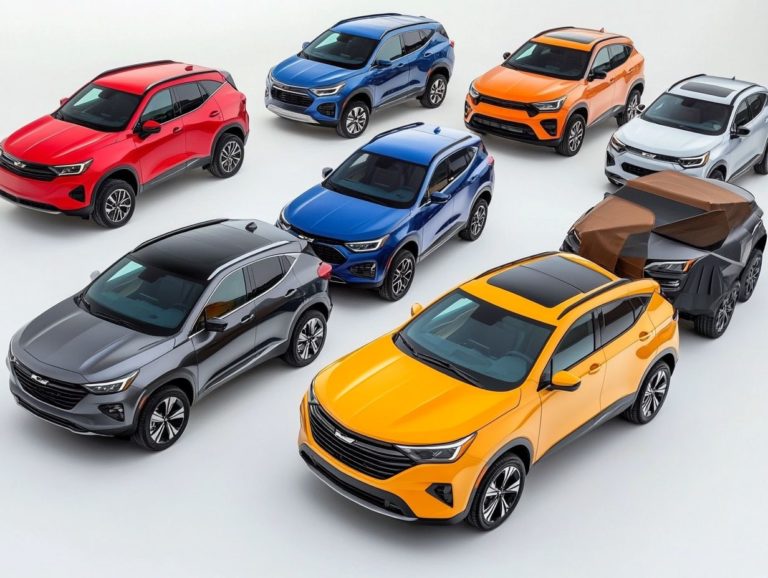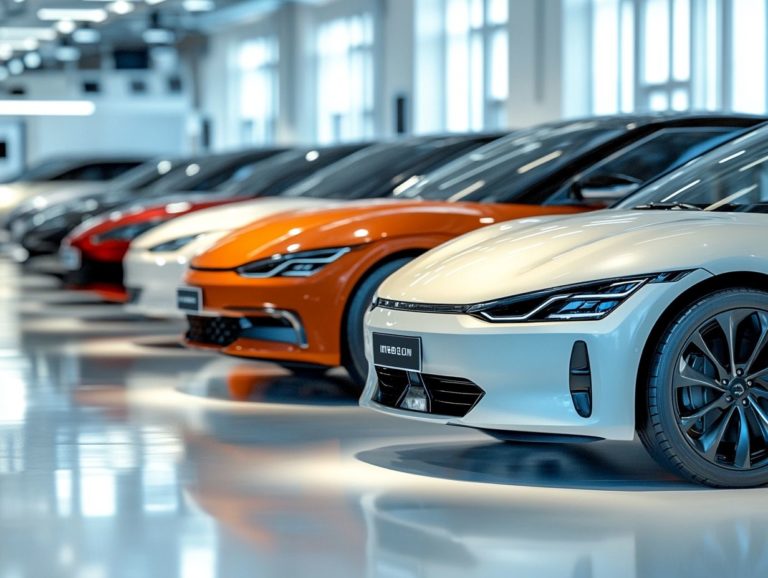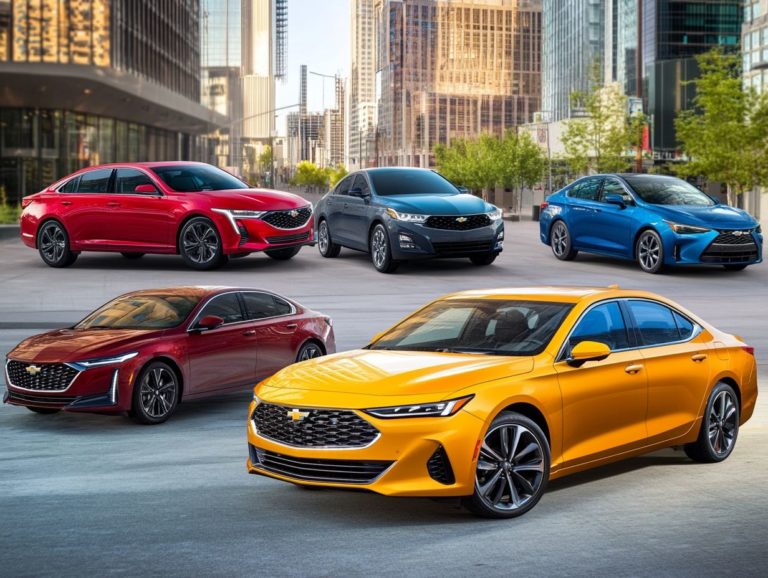Electric Car Costs: A Price Comparison Guide
Electric cars are swiftly gaining traction among eco-conscious drivers and individuals keen on reducing their fuel expenses.
This article examines the costs linked to electric vehicles, covering everything from initial purchase prices and charging fees to maintenance and repair requirements.
It also delves into various factors that impact these expenses, compares electric vehicles and traditional gasoline cars, and provides tips for maximizing your savings.
Prepare yourself to make a well-informed choice for your next vehicle!
Contents
- Key Takeaways:
- Costs of Owning an Electric Car
- Factors Affecting the Cost of Electric Cars
- Comparing Electric Cars to Gasoline Cars
- Tips for Saving Money on Electric Cars
- Frequently Asked Questions
- What is the purpose of the Electric Car Costs: A Price Comparison Guide?
- Are electric cars more expensive than traditional gas-powered cars?
- What are the main factors that contribute to the cost of an electric car?
- How do maintenance costs for electric cars compare to gas-powered cars?
- Does the cost of electricity impact the overall cost of owning an electric car?
- How can I accurately compare the costs of different types of electric cars?
Key Takeaways:
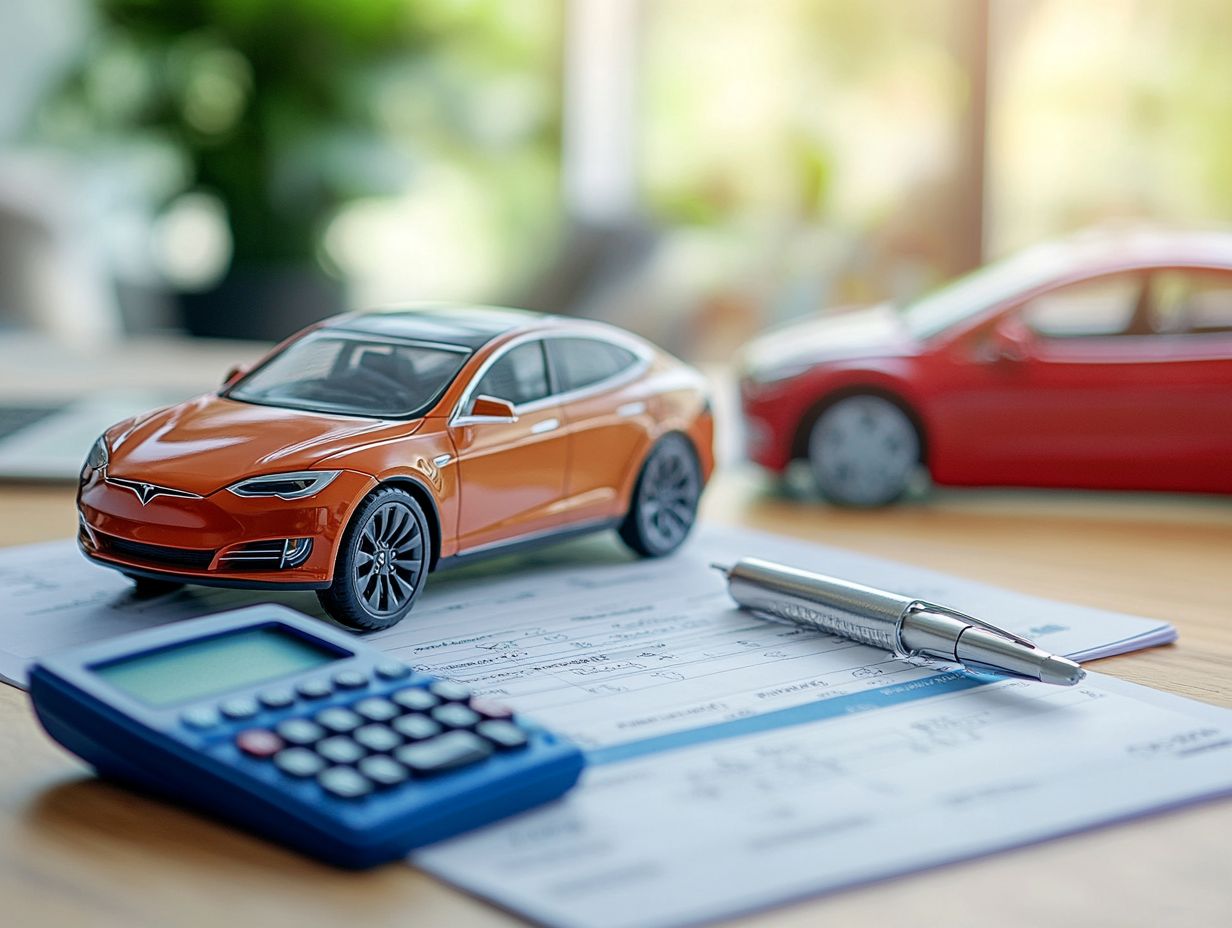
- Electric cars can be more expensive upfront but have lower long-term costs due to savings on fuel and maintenance.
- Factors such as battery range, incentives, and charging station availability also impact the overall cost of owning an electric car.
- Consider leasing or buying a used electric car and practicing energy-efficient driving habits to save money.
What are Electric Cars?
Electric cars, or Electric Vehicles (EVs), represent a groundbreaking shift in the automotive world, operating on electricity instead of traditional gasoline. You ll find various models, including plug-in hybrids and fully electric vehicles, all providing a cleaner alternative to gas cars while addressing climate concerns and rising fuel costs.
With advancements in battery technology, vehicles like the Tesla Model 3, Hyundai Ioniq 6, and Ford Mustang Mach-E are becoming increasingly popular among consumers who prioritize energy efficiency.
These vehicles rely on energy stored in large battery packs, which you can replenish through home chargers or public charging stations. Unlike gas-powered cars that emit harmful pollutants, EVs produce zero tailpipe emissions, significantly enhancing air quality.
The emergence of electric utilities offering specialized charging programs is easing worries about range anxiety the fear of running out of battery power before reaching a charging station and the availability of charging stations. Industry leaders are consistently pushing the envelope, integrating features in the latest models aimed at sustainability and reducing carbon footprints.
This positions electric cars as a forward-thinking choice for those who care about the environment.
Costs of Owning an Electric Car
Owning an electric car presents a unique cost structure distinct from that of traditional gas vehicles. It’s crucial to grasp the total cost involved before making a purchase. For a deeper understanding, check out electric cars vs. gasoline cars and consider the various elements at play: the initial purchase price, charging expenses, and maintenance costs.
Each of these can fluctuate based on factors such as the specific vehicle model, energy efficiency, and the array of federal and state incentives available, including tax credits designed to effectively reduce the average price of new electric vehicles. Understanding these nuances allows you to make a well-informed decision that aligns with your financial goals.
Initial Purchase Price
The initial purchase price of an electric vehicle is often a significant consideration for you as you contemplate the shift from gas cars. Many new EV models come with a premium price tag compared to their gasoline counterparts. However, thorough research using resources like Kelley Blue Book, along with knowing how to spot overpriced cars, can uncover the potential to offset that average price through federal EV tax credits and state incentives, making electric cars more accessible than ever.
As the EV market evolves, factors such as technological advancements and increased competition are gradually driving down initial costs. You now enjoy a broader selection of models, ranging from budget-friendly choices to luxury electric sedans, enabling you to find a vehicle that aligns with your financial situation.
In contrast to traditional gas vehicles, where prices can vary widely based on fuel demand, many consumers are discovering that the lifetime savings associated with lower operating costs and reduced fuel dependence often outweigh any higher upfront expenses. This growing awareness is exciting more people to choose electric vehicles!
Charging Costs
Charging costs vary greatly based on your choice of a home charger or public charging stations. It’s essential for electric vehicle owners to understand their energy needs.
Factors like regional electricity rates and charging station efficiency significantly affect costs. These factors can influence your driving habits and energy savings over time.
Home charging usually offers predictable costs, allowing homeowners to benefit from lower off-peak electricity rates. Public charging stations can be confusing due to variable pricing and extra fees based on usage or location.
By understanding these factors, you can plan your charging habits smartly. Stay informed about local rates to ensure each charge supports your budget and driving patterns.
Maintenance and Repair Costs
Maintenance and repair costs for electric cars are often lower than for gas vehicles. This is one of the major benefits of owning an electric vehicle.
Electric vehicles have fewer moving parts, which means you’ll likely face fewer issues. For instance, you won t need oil changes, fuel filters, or spark plugs.
When considering the lifetime cost of ownership, many find that reduced maintenance leads to a smoother, hassle-free journey on the road.
Factors Affecting the Cost of Electric Cars

Several factors can greatly influence the cost of electric cars, including battery range, efficiency, available incentives, and charging station accessibility.
Understanding these elements helps you make informed decisions based on your driving needs.
Battery Range and Type
The battery range and type directly affect the cost and how easy it is to use electric vehicles. Newer models feature advanced battery technology for longer ranges.
As the demand for reliable transportation grows, more people seek models that alleviate range anxiety. Entry-level models may have basic lithium-ion batteries, while premium options use solid-state or lithium-sulfur batteries for greater distances.
These innovations enhance performance and reduce the cost per mile, attracting more drivers to electric vehicles.
Fast-charging also makes certain EVs top choices, especially for those who often go on long journeys!
Incentives and Tax Credits
Federal incentives and tax credits play a vital role in the transition to electric vehicles, making them financially accessible to a wider audience. Programs established by the Inflation Reduction Act enable you to enjoy significant savings through state and federal incentives, effectively lowering the overall cost of ownership.
Federal initiatives and state programs encourage electric vehicle adoption! These might include rebates, grants, and additional tax credits tailored specifically for local consumers.
As a potential buyer, understanding these incentives can help make your budget work for you. Some states offer substantial rebates that can dramatically reduce the initial purchase price. Others provide benefits like lowered registration fees or exclusive access to carpool lanes.
Since state-specific incentives can vary widely, they can significantly shape your decision-making process. Don’t forget to consider the vehicle s price and the exciting savings available in your area!
Availability of Charging Stations
Charging stations are key for owning an electric vehicle. They make driving easier and more convenient, directly impacting your driving habits and the overall appeal of the EV market.
With various charging options at your disposal, you re more likely to embrace the switch from traditional gasoline vehicles to electric alternatives. The convenience of charging locations whether at home or along your frequently traveled routes greatly influences your decision-making process.
If you have a longer commute, you might prioritize access to fast-charging stations to minimize downtime. Conversely, if your trips tend to be shorter, you may feel more at ease relying on home charging solutions.
As the network of charging stations expands, it boosts your confidence and reinforces that electric vehicle ownership can seamlessly integrate into diverse lifestyles and daily routines!
Comparing Electric Cars to Gasoline Cars
When comparing electric cars to gasoline vehicles, the distinctions go well beyond just the initial purchase price. You need to consider fuel costs and explore the top 5 electric cars: price comparisons and the potential long-term savings that come with ownership.
As fuel prices keep climbing, the advantages of electric vehicles become more apparent, positioning them as an appealing choice for those who are mindful of their budgets.
Cost of Fuel
The cost of fueling electric vehicles, mainly shaped by charging expenses and electricity rates, offers a compelling advantage over traditional gasoline vehicles. You ll find significant energy savings, especially when you assess your mileage rate along with the fluctuating prices at the pump.
Reflecting on your personal driving habits, it s clear that households with higher daily mileage stand to gain even more from the switch to electric. With electricity rates generally more stable than gasoline prices, you can project your monthly energy costs with added confidence!
The growing availability of incentive programs for electric vehicle charging can further lower your overall expenses.
This means that, over time, you’ll not only enjoy reduced fuel costs as an electric vehicle owner but also foster a more predictable budgeting strategy, ultimately enhancing your financial well-being.
Long-Term Savings
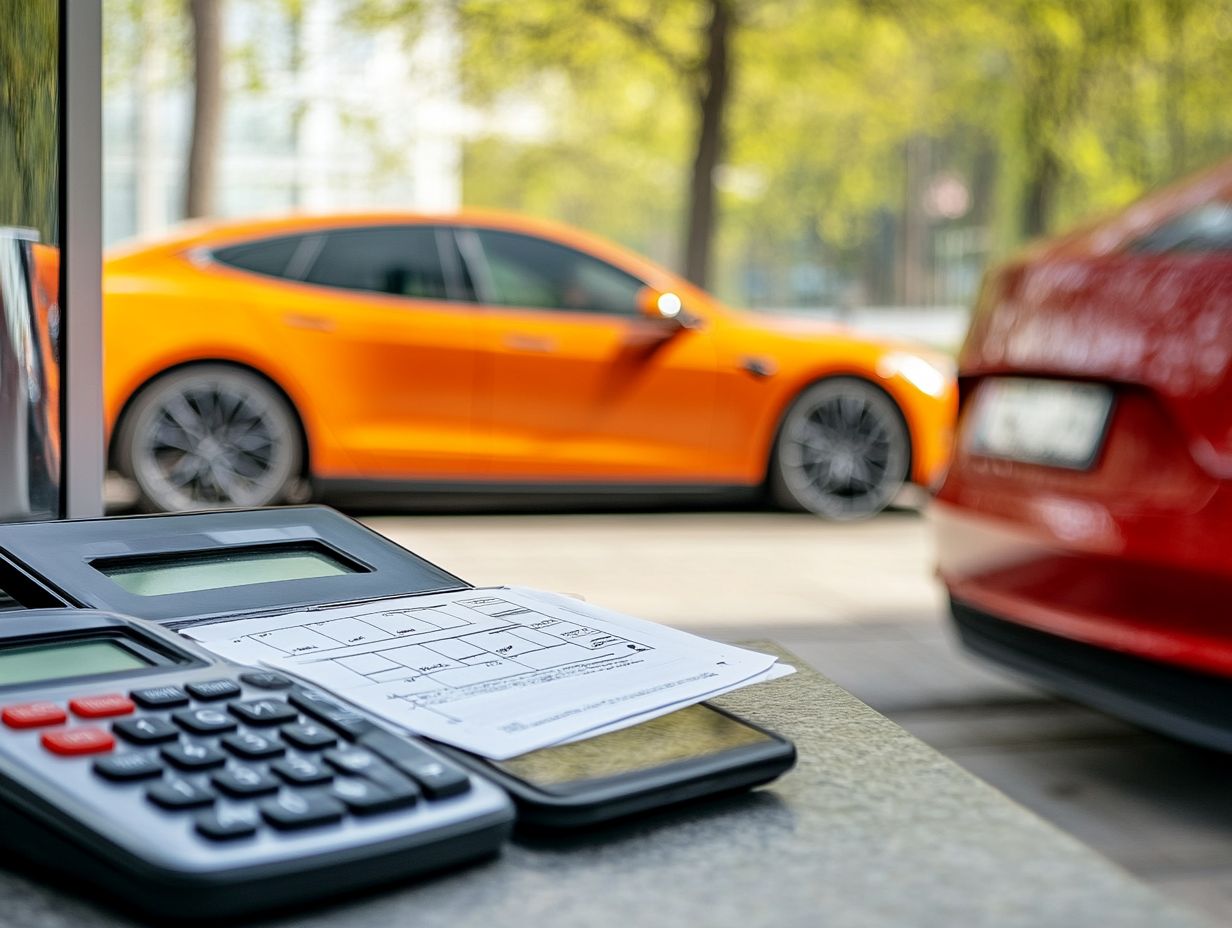
The long-term savings associated with electric vehicles often outshine the initial higher purchase price, making them a savvy investment for many drivers like you.
Factors such as reduced maintenance costs, fuel savings, and the overall amount you’ll spend over time, including purchase, maintenance, and fuel costs play a significant role in their financial viability over time.
The beauty of an electric motor lies in its simplicity. Electric vehicles feature fewer moving parts, which translates to considerably lower repair and maintenance expenses compared to traditional gas vehicles.
Gas vehicles often demand oil changes, exhaust system repairs, and engine overhauls.
Electric vehicles are energy efficient, allowing you to enjoy lower charging costs. This is a stark contrast to the unpredictable prices of gasoline, leading to substantial savings at the pump.
For those who enjoy keeping tabs on their financial benefits, a variety of apps and online tools can assist in monitoring charging costs, calculating miles per charge, and comparing maintenance expenses against gas-powered options.
This paints a clearer picture of your overall savings and helps you appreciate the advantages of going electric.
Tips for Saving Money on Electric Cars
Saving money on electric cars means understanding leasing and buying. Each option has its pros and cons.
Energy-efficient driving habits maximize your savings and make your ownership experience cost-effective and environmentally friendly.
Leasing vs. Buying
Choosing between leasing and buying an electric car requires you to weigh total ownership costs against your finances and driving needs.
Leasing offers lower monthly payments but comes with mileage limits. Buying gives you long-term ownership benefits and potential resale value.
For many, this decision can significantly impact their budget and lifestyle.
If you enjoy driving a new vehicle every few years without worrying about depreciation, leasing might be the way to go.
Conversely, if you value unlimited mileage and take pride in ownership, buying could be more appealing.
The financial implications can vary widely based on factors like interest rates, incentives, and tax benefits. It s crucial to assess your specific circumstances.
Ultimately, aligning your choice with your individual driving requirements and how you plan to use the vehicle will lead to a more informed and satisfying decision.
Used Electric Cars
Buying used electric cars can save you money. This makes owning an electric vehicle more accessible.
With the growing availability of pre-owned EVs on the market, you can discover models that align with your budget while still reaping the benefits of electric driving.
This trend boosts affordability and encourages a sustainable future by helping more people switch from gas-powered cars.
As a prospective buyer, you should consider potential drawbacks, such as battery longevity and software updates, in relation to your desire for eco-friendly transportation.
Despite these factors, the rapidly evolving EV market continues to expand, offering a wealth of quality options.
Many reputable dealerships now provide certified pre-owned vehicles, complete with warranties and thorough inspections, instilling confidence in those who might otherwise hesitate.
By making informed choices, you can enjoy the advantages of electric mobility without compromising on quality.
Embrace the electric revolution and enjoy savings while contributing to a greener planet!
Smart Driving Habits
Adopting smart driving habits is essential for you to get the most out of your electric vehicle and achieve big savings over time. Simple practices like smooth acceleration, regenerative braking, and mindful route planning can significantly enhance the overall efficiency of your electric vehicle s operation.
By embracing these habits, you ll not only improve your vehicle’s range but also reduce wear and tear, which translates to lower maintenance costs in the long run.
Utilizing features like cruise control and ensuring optimal tire pressure can further elevate your vehicle’s performance. For example, a steady speed and anticipating traffic lights can help you avoid unnecessary stops, conserving valuable battery power.
These smart choices lead to savings and create a more enjoyable driving experience. You ll enjoy a smoother ride and feel great about making a positive impact on the environment.
Frequently Asked Questions
Here are some common questions about electric car costs.
What is the purpose of the Electric Car Costs: A Price Comparison Guide?
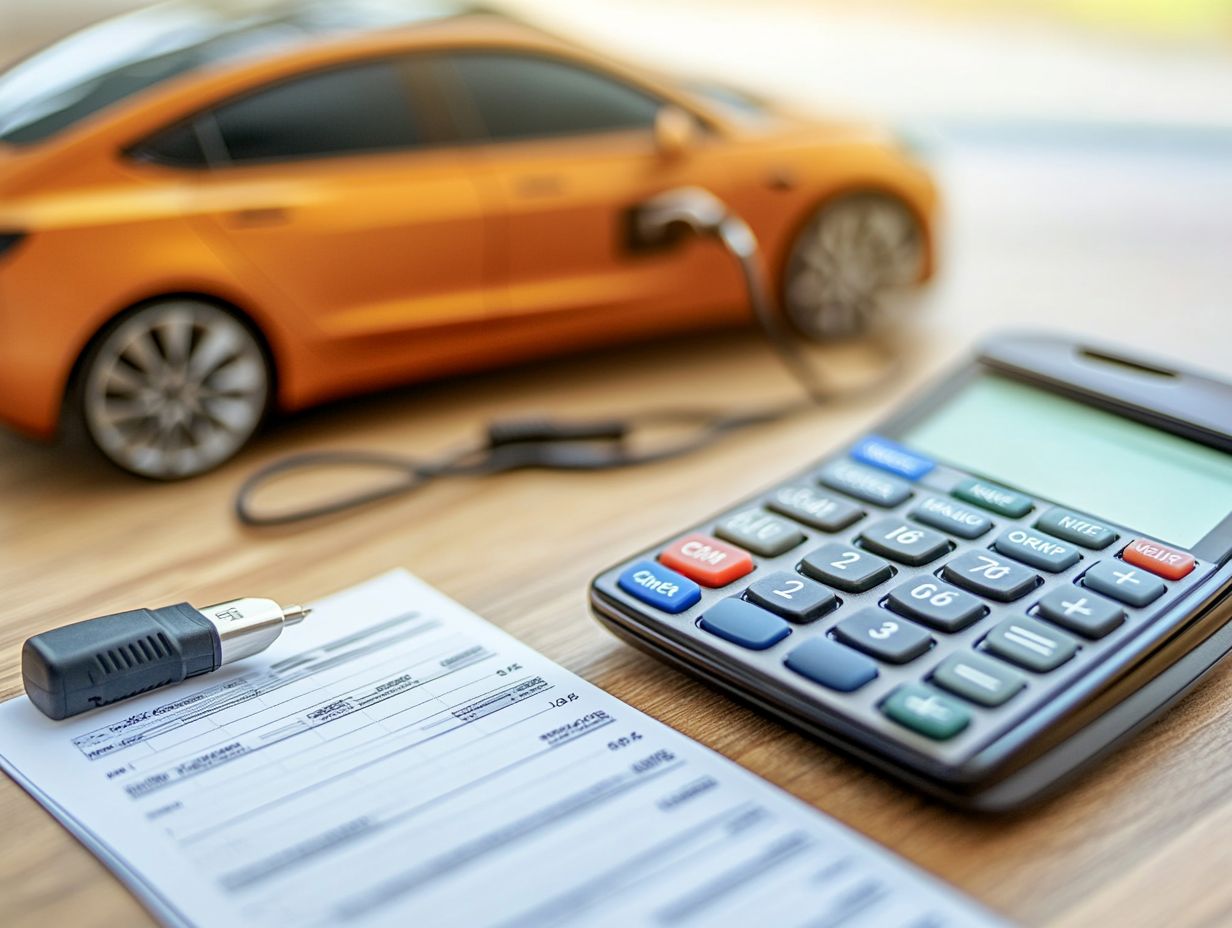
The purpose of this guide is to provide consumers with a comprehensive comparison of the costs associated with owning an electric car, including the initial purchase price, maintenance costs, and savings on fuel and upkeep.
Are electric cars more expensive than traditional gas-powered cars?
While the initial purchase price of an electric car may be higher than a gas-powered car, it is important to also consider the long-term savings on fuel and maintenance costs. Many governments also provide tax incentives and rebates for purchasing an electric car.
What are the main factors that contribute to the cost of an electric car?
The cost of an electric car is primarily determined by the battery size and technology, the manufacturer, and the model’s features and amenities. Other factors such as taxes, registration fees, and insurance costs may also vary depending on location.
How do maintenance costs for electric cars compare to gas-powered cars?
Generally, electric cars have fewer moving parts and require less frequent maintenance compared to traditional gas-powered cars. This can result in significant savings over time, as well as a more environmentally friendly option.
Does the cost of electricity impact the overall cost of owning an electric car?
While the cost of electricity may vary depending on location and energy providers, it is still significantly cheaper than gasoline. This means that even with fluctuations in electricity prices, electric cars still offer long-term savings compared to gas-powered cars.
How can I accurately compare the costs of different types of electric cars?
To accurately compare the costs of different electric cars, it is important to consider the total cost of ownership, including the initial purchase price, fuel and maintenance costs, and potential tax incentives. Using tools like the luxury electric vehicles price comparison can also help you input specific information for a more personalized comparison.
Explore electric vehicles further to see how they can fit your lifestyle and save you money!


